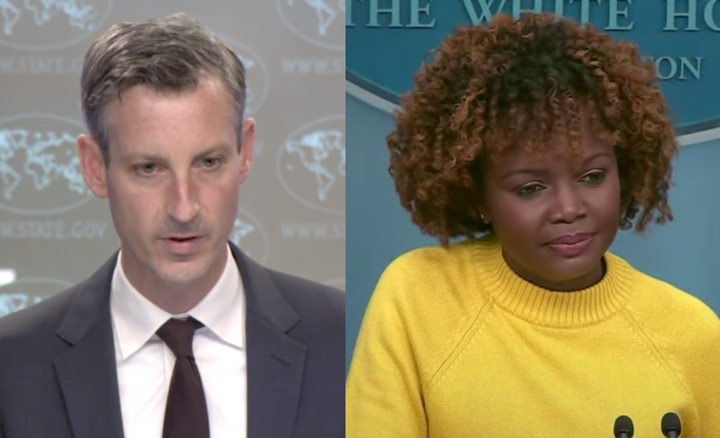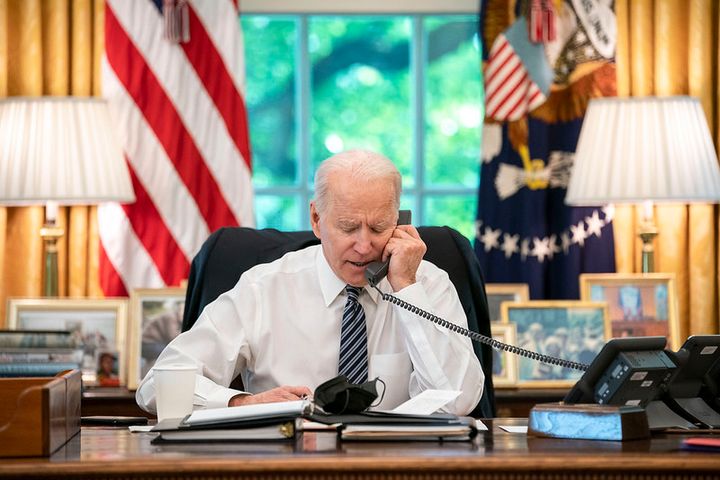Biden Terrifyingly Grows Ranks Of Government Spies
The White House enthusiastically backed surveillance reauthorization that despite a fresh record of routine abuses expands security agencies' spying power.

On April 20, Edward Snowden declared, “America lost something important today, and hardly anyone heard. The headlines of state-aligned media screech and crow about the nefarious designs of your fellow citizens and the necessity of foreign wars without end, but find few words for a crime against the Constitution.”
The NSA whistleblower was referring to the United States Senate reauthorizing and expanding surveillance under Section 702 of the Foreign Intelligence Surveillance Act.
President Joe Biden circulated a memo that cast the Fourth Amendment right to privacy as a "threat to national security." Biden National Security Advisor Jake Sullivan and Attorney General Merrick Garland called members of Congress to ensure that they voted to give spy agencies renewed power.
Specifically, “Patriot Act 2.0,” as Representative Zoe Lofgren called it, broadened the definition of service providers and exponentially increased the power that the government has to force numerous business and industries to aid warrantless surveillance.
Senator Ron Wyden strongly opposed the legislation and even introduced an amendment that would have prevented this assault on civil liberties. But the Senate rejected his effort to protect privacy.
“The Senate waited until the 11th hour to ram through renewal of warrantless surveillance in the dead of night,” Wyden stated. He also added, “It is clear from the votes on very popular amendments that senators were unwilling to send this bill back to the House, no matter how common-sense the amendment before them.”
Although the Foreign Intelligence Surveillance Court (FISC) renewed Section 702 until April 2025, allowing lawmakers plenty of time to appropriately draft and amend legislation, panic was stirred by Biden and the national security state.
Wyden, who has a track record of challenging surveillance, did not mince words. He described the provision that he fought, which was dubbed the “Make Everyone A Spy” provision, as “one of the most dramatic and terrifying expansions of government surveillance authority in history.”
“It allows the government to force any American who installs, maintains, or repairs anything that transmits or stores communications to spy on the government’s behalf. That means anyone with access to a server, a wire, a cable box, a wifi router, or a phone. It would be secret: the Americans receiving the government directives would be bound to silence, and there would be no court oversight.”
Forcing More Service Providers To Spy On Customers
The Biden administration applauded the passage of legislation that expanded warrantless surveillance. “The President will swiftly sign the bill into law, ensuring that our security professionals can continue to rely on Section 702 to detect grave national security threats and use that understanding to protect the United States,” Sullivan stated.
Section 702 used to primarily apply to telecommunications or technology companies. Now, as detailed by Demand Progress, Section 702 may be used to force business landlords, cleaning contractors, delivery personnel, utility providers, etc, to help U.S. security agencies spy without probable cause.
Entities and individuals required to help with surveillance cannot speak about it. Their First Amendment speech rights are curtailed as they violate their customers’ Fourth Amendment privacy rights.
Also, according to Demand Progress, House Intelligence Committee Chair Mike Turner and House Intelligence Committee Ranking Member Jim Himes drafted the expanded surveillance reauthorization without defining terms like “any other service provider,” “access to equipment,” or “custodian.”
Only as a result of opposition did security hawks insert an exemption for coffee shops, hotels, and libraries.
Writing about the impact on journalism for The Nation, longtime national security journalist James Bamford wrote, “A requirement could easily be added to Section 702 that compels the need for a warrant as soon as an NSA employee or FBI agent recognizes that the communication involves a journalist conducting an interview, or an attorney engaged in a conversation with a client or source.”
“In the end,” Bamford argued, “insight gained from the American journalist’s interaction with a foreign source may be far more valuable and provide considerably more insight than inhibiting sources to interact with journalists.”
The FBI consistently abused the surveillance power it was granted under Section 702 before the authority was reauthorized. It is a certainty that the FBI will abuse this ill-defined authority handed to them by Biden and Congress.
No Justification For Opposing A Warrant
House Speaker Mike Johnson was at one point an opponent of warrantless surveillance under FISA. He claimed that he shifted his position because as Speaker he is privy to “confidential briefings” that have showed him how critical Section 702 is to “national security.”
“I personally used 702 authorities at NSA,” Snowden responded. “There is absolutely nothing in any briefing of any level, then or now, that would justify opposition to recognizing the government's obligation to seek a warrant for searches of Americans' communications, which are constitutionally-protected.”
“And frankly, let's be serious: the NSA and FBI have plainly demonstrated that they're more than comfortable violating the law when they feel it binds too tightly. 278,000 times just for one auth: 702. Millions and millions of times under others for [President Barack] Obama. And on a literally innumerable scale under [President George W.] Bush—we couldn't even count it.”
“So let's not pretend that, in the apocryphal ‘ticking time-bomb’ scenario of the Hollywood imagination, that a series of agencies which have since their inception been characterized by a criminally casual respect for the Constitution would feel in the slightest way encumbered by something as parochial as the law,” Snowden added. “After all, the legislation rarely ascribes penalties for federal infractions.”
The House Judiciary Committee passed legislation—the Protect Liberty and End Warrantless Surveillance Act—at the end of 2023 that would have required a warrant for any U.S. person search. However, through the House Intelligence Committee, U.S. officials thwarted attempts to constrain the national security state.
During a private meeting on reauthorization, WIRED reported that Turner “presented an image of Americans protesting the war in Gaza while implying possible ties between the protesters and Hamas, an allegation that was used to illustrate why surveillance reforms [would be] detrimental to national security.”
It is highly likely that antiwar or pro-Palestinian protests, particularly on college or university campuses, will be targeted. Biden will probably have no problem with using this expanded spying power against students.
A day after Biden signed the reauthorization bill, White House Deputy Press Secretary Andrew Bates accused student demonstrators opposed to Israel’s assault on Gaza of “echoing the rhetoric of terrorist organizations.”
Hawkishly Backing The National Security State
Back in 2008, Democratic presidential candidate Barack Obama campaigned against retroactive immunity for telecommunications companies that helped Bush engage in warrantless wiretapping. He even promised to filibuster the FISA Amendments Act. But Obama voted for the bill when there were 46 different lawsuits pending against the companies and angered many progressives and civil liberties advocates.
Biden, who was Obama's vice president, did not even pretend to support reform, greater accountability, or limits to government surveillance. Fifteen years after Obama flip-flopped, Sullivan, his national security advisor, made it clear that the administration believed that “failure to reauthorize Section 702” would be “one of the worst intelligence failures of our time.”
He additionally urged Congress to reauthorize Section 702 “without new and operationally damaging restrictions on reviewing intelligence” and “with measures that build on proven reforms.” That was subtle language, which sent a message to representatives and senators that Biden opposed adding a warrant requirement to protect Americans’ privacy rights.
Hawkish lawmakers, intelligence officials, and the Biden White House conspired to pass an updated surveillance law that not only avoided meaningful reforms but also expanded the law in a way that U.S. intelligence agencies could only dream about a year or two ago.
For many months, news reports detailed stories of spying abuses and enraged lawmakers. That gave some hope to those in favor of privacy that Congress might rein in government surveillance. Yet the national security state stayed the course. They once again hid the truth from elected officials, accelerated the process, and fear-mongered and spread propaganda to escape accountability.



Comments ()